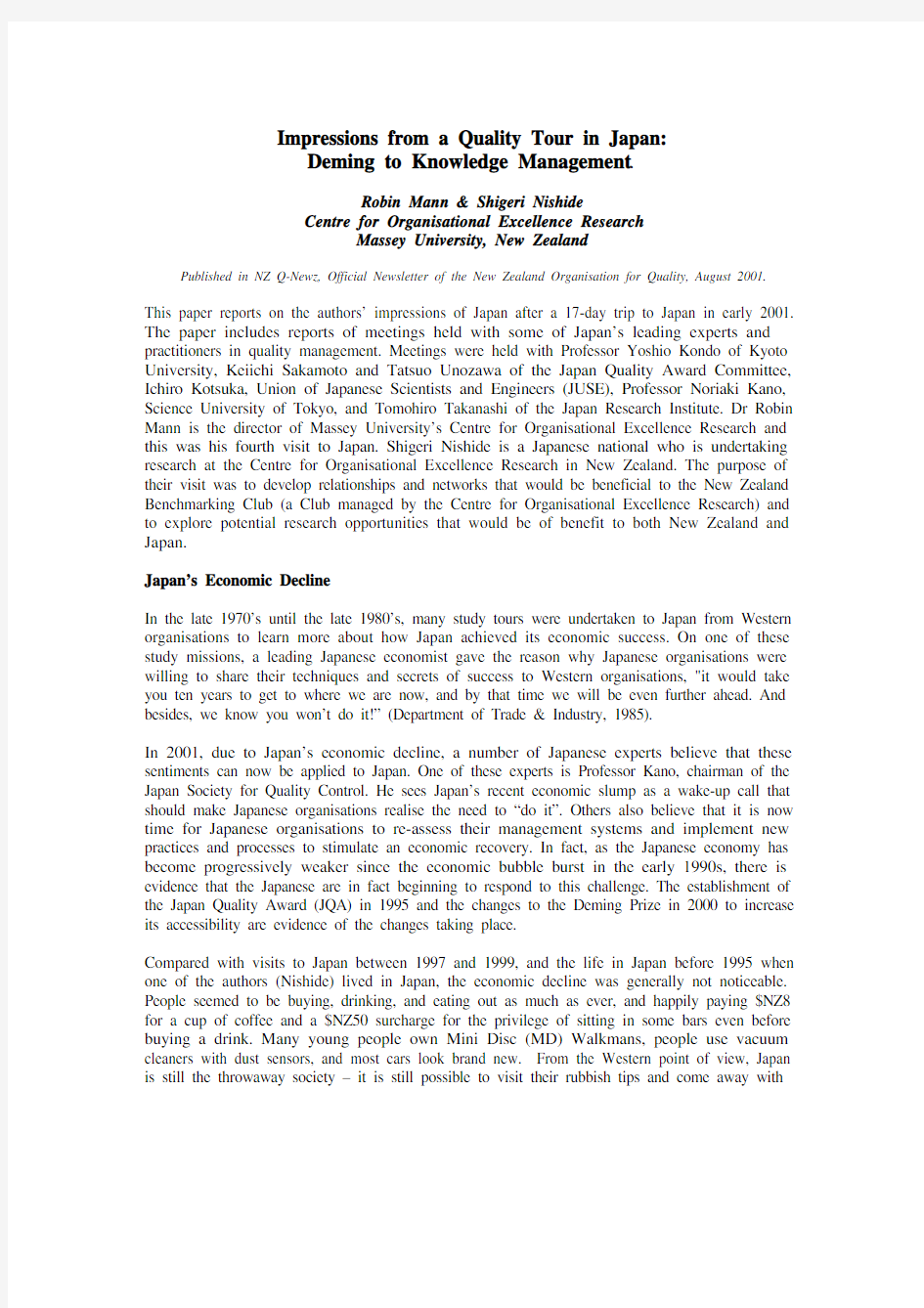
japan
- 格式:pdf
- 大小:102.76 KB
- 文档页数:11


Impressions from a Quality Tour in Japan:
Deming to Knowledge Management.
Robin Mann & Shigeri Nishide
Centre for Organisational Excellence Research
Massey University, New Zealand
Published in NZ Q-Newz, Official Newsletter of the New Zealand Organisation for Quality, August 2001. This paper reports on the authors’ impressions of Japan after a 17-day trip to Japan in early 2001. The paper includes reports of meetings held with some of Japan’s leading experts and practitioners in quality management. Meetings were held with Professor Yoshio Kondo of Kyoto University, Keiichi Sakamoto and Tatsuo Unozawa of the Japan Quality Award Committee, Ichiro Kotsuka, Union of Japanese Scientists and Engineers (JUSE), Professor Noriaki Kano, Science University of Tokyo, and Tomohiro Takanashi of the Japan Research Institute. Dr Robin Mann is the director of Massey University’s Centre for Organisational Excellence Research and this was his fourth visit to Japan. Shigeri Nishide is a Japanese national who is undertaking research at the Centre for Organisational Excellence Research in New Zealand. The purpose of their visit was to develop relationships and networks that would be beneficial to the New Zealand Benchmarking Club (a Club managed by the Centre for Organisational Excellence Research) and to explore potential research opportunities that would be of benefit to both New Zealand and Japan.
Japan’s Economic Decline
In the late 1970’s until the late 1980’s, many study tours were undertaken to Japan from Western organisations to learn more about how Japan achieved its economic success. On one of these study missions, a leading Japanese economist gave the reason why Japanese organisations were willing to share their techniques and secrets of success to Western organisations, "it would take you ten years to get to where we are now, and by that time we will be even further ahead. And besides, we know you won’t do it!” (Department of Trade & Industry, 1985).
In 2001, due to Japan’s economic decline, a number of Japanese experts believe that these sentiments can now be applied to Japan. One of these experts is Professor Kano, chairman of the Japan Society for Quality Control. He sees Japan’s recent economic slump as a wake-up call that should make Japanese organisations realise the need to “do it”. Others also believe that it is now time for Japanese organisations to re-assess their management systems and implement new practices and processes to stimulate an economic recovery. In fact, as the Japanese economy has become progressively weaker since the economic bubble burst in the early 1990s, there is evidence that the Japanese are in fact beginning to respond to this challenge. The establishment of the Japan Quality Award (JQA) in 1995 and the changes to the Deming Prize in 2000 to increase its accessibility are evidence of the changes taking place.
Compared with visits to Japan between 1997 and 1999, and the life in Japan before 1995 when one of the authors (Nishide) lived in Japan, the economic decline was generally not noticeable. People seemed to be buying, drinking, and eating out as much as ever, and happily paying $NZ8 for a cup of coffee and a $NZ50 surcharge for the privilege of sitting in some bars even before buying a drink. Many young people own Mini Disc (MD) Walkmans, people use vacuum cleaners with dust sensors, and most cars look brand new. From the Western point of view, Japan is still the throwaway society – it is still possible to visit their rubbish tips and come away with